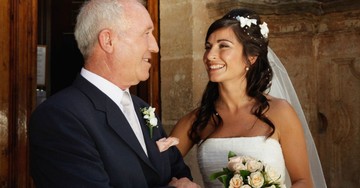5 Mistakes in David and Michal's Marriage (and How You Can Do Better)

David and who?
That would be Michal, daughter of Saul. She married David while he was still serving Saul, Israel's first king. His fame came after he slaughtered Goliath, the giant, in front of the immobilized Israelite army.
Because David and Michal shared a back story, let's review their history before we delve into the meat of this article.
After realizing his daughter had fallen in love with David, Saul arranged a royal marriage for the two (1 Samuel 18:20-27). Saul's hope for the marriage? That he would delegate David to fight the Philistines, and—fingers crossed—he would be killed in action.
What a wicked father-in-law (and father)! Not to mention slow on the uptake. Didn't Saul recall it was also David who destroyed the Philistine giant? If David could destroy a hulk of a soldier, why wouldn't he do the same with mere mortal-sized combatants?
Regardless of her father's sinister scheme for her marriage, however, Michal held true affection for David. She helped him escape Saul's murderous rage and even lied to her dad in the process (1 Samuel 19:11-17).
Michal chose to side with her husband, a nobody at the time, even if it meant standing up to her own father, the most powerful man in the land. Sounds like real love, doesn't it?
Sadly, Saul's insistence on hunting David ripped the newlyweds apart. While David had to leave their home to live on the lam, Michal stayed put. Saul eventually married her off to another man (1 Samuel 25:44).
We last see David and Michal together in 1 Samuel 19. They weren't reunited until 2 Samuel 6. In between these chapters significant events unfolded, affecting both of them. For instance, Saul and Jonathan, his firstborn, died on the battlefield.
Michal must have grieved the traumatic loss of her father and brother.
As for David, he married two other women (1 Samuel 25:42-43) before contacting Saul's surviving son to demand the right to have Michal back (2 Samuel 3:14-16).
Which is where their story picks up in 2 Samuel 6.
Let's zoom in on David's public celebration for the return of the ark of the Lord. He twirled in his linen ephod, dancing his heart out (2 Samuel 6:14-15). But when Michal saw it, she was "contemptuous of him in her heart" (2 Samuel 6:16, NASB).
Everything went downhill from this point on. The chapter closes with an ominous announcement, "Michal the daughter of Saul had no children to the day of her death" (2 Samuel 6:23). At least one commentary explains this verse as David refusing to ever share her bed again after what happened.
Let's learn about five of their mistakes to keep our marriages from suffocating.
Photo credit: ©SWN/Image created using DALL.E 2024 AI technology
1. Censure Contempt

1. Censure Contempt
SLIDE 1 OF 6
Dr. John Gottman, who is world renowned for his research on married couples, discovered a few predictors for divorce. One of the most powerful predictors is the presence of contempt in the marriage—the opposite of respect.
Given his solid body of research, don't ever let yourself sink to the point of despising your mate. If you let contempt sprout in your heart, it will eventually spill over into words because out of the abundance of the heart, the mouth speaks (Luke 6:45). In turn, life and death are in the power of our tongue (Proverbs 18:21). Speaking contemptuous words has the power to not just sour a moment, but sink the relationship altogether.
How do you avoid having contempt for your mate? Lean on curiosity. Even if you know each other extremely well, don't assume you know every motivation behind your mate's behavior. Don't mindread either. Had Michal approached David with genuine curiosity, "why did you feel it's important to wear the linen ephod and dance with abandon?", their love story could've concluded on a cheery note.
On that note, ladies, allow me to talk to just you. Dr. Gottman's research covers the need for both spouses to respect each other. However, respecting our husbands is a special call on our lives (Ephesians 5:22, 33). God designated one ingredient to help the male psyche thrive: his bride's respect. So, please strive to grow your respect for your man. Maybe even solicit his input: does he feel your respect in public? When you two are alone? How about when the kids are around?
By respecting your mate, you're protecting your marriage from the toxin of contempt.
Photo credit: ©Pexels/Vitaly Gariev
2. Graciously Reunite

2. Graciously Reunite
SLIDE 2 OF 6
Work creates recurrent periods of parting for most couples. Maybe you stay at home with the kids while your spouse clocks in at work. Or maybe you both work, but at different places.
Upon seeing each other after work, train your mouth to only open with kindness (Proverbs 31:26). Don't greet the one you married with immediate criticism like Michal, unfortunately, did: "When David returned home to bless his own family, Michal, the daughter of Saul, came out to meet him. She said in disgust, 'How distinguished the king of Israel looked today, shamelessly exposing himself to the servant girls like any vulgar person might do!'" (2 Samuel 6:20, NLT).
Treat the first few moments when you and your spouse reunite as sacred. These moments can set the tone for the rest of your time together that day. If you approach each other with love and gentleness, you're less likely to spend the rest of the evening sniping at your mate.
3. Don't Escalate

3. Don't Escalate
SLIDE 3 OF 6
Did David enjoy being blasted by his wife? Obviously not. But his response escalated their fight. Notice how David answered Michal's opening salvo: "It was before the LORD, who chose me rather than your father or anyone from his house when he appointed me ruler over the LORD's people Israel—I will celebrate before the LORD" (2 Samuel 6:21).
Translation: let me remind you how God picked me to be king. Who did I replace again? Oh, that's right. Your dad! Besides, God also rejected all your brothers, and even you, from being the ruler. Loser!
Okay, David didn't actually call his wife a loser. But his response didn't mend their rift either. It certainly reminded Michal of the losses she had endured and might have also offended her. David's acerbic response might have also sparked another verbal sparring.
It's hard not to respond in kind, especially when your spouse launches at you with fangs bared. That's why the next point is pivotal to learn.
Photo credit: ©Getty Images/gorodenkoff
4. Refrain from Retaliating

4. Refrain from Retaliating
SLIDE 4 OF 6
One of the tragic truths about this story has to do with David's noble intentions. He celebrated the ark with all his might because of his gratitude to the Lord, who had appointed him king over their nation (2 Samuel 6:21). Then, he went home with the expressed purpose of "bless[ing] his own household" (2 Samuel 6:20, NASB).
After publicly praising God, the first thing on David's mind was to get home so he could bless his family, which, of course, included Michal.
But she lit into him before he could so much as say hi.
Remember the period of separation we talked about before? You may have all the intentions to leave behind the stress of the day by snuggling with your mate the moment you arrive at home. However, you also don't know the kind of day your spouse had. Depending on how taxing his or her day has been, your partner may not receive you with open arms.
Determine ahead of time that you'll have a sweet attitude no matter what. This way, even if your spouse springs an attack on you or another unexpected thing pops up, you're still be prepared to respond in love. Breathe deeply, remain calm, and try curiosity: "What happened, honey? What upset you?"
5. Introspection Between Relationships

5. Introspection Between Relationships
SLIDE 5 OF 6
Michal's father married her off to another man after David fled. When David initiated their reunification, Michal's other husband was deeply affected:
"David sent messengers to Ish-Bosheth son of Saul, demanding, 'Give me my wife Michal, whom I betrothed to myself for the price of a hundred Philistine foreskins.' So Ish-Bosheth gave orders and had her taken away from her husband, Paltiel, son of Laish. Her husband, however, went with her, weeping behind her all the way to Bahurim. Then Abner said to him, "Go back home!" So he went back" (2 Samuel 3:14-16).
If the forced separation prompted Paltiel, Michal's other husband, to trail her and weep all the way, it stands to reason their marriage must have been halfway decent. Why would anyone weep when a wretched wife leaves?
It's clear Paltiel mourned the loss of his wife. But what about her? Did Michal ever have the chance to mourn her torn relationship with Paltiel?
We don't know. But what we do know is about 65% of second marriages end in divorce, higher than the divorce rate for first-time marriages. One expert explains this is partly due to the dizzying speed at which divorcees dive into their second union.
Theological arguments about whether God allows divorced believers to remarry or not are beyond the scope of this article. Suffice it to say, if you're divorced and your conscience is clear about remarrying, please don't skip this step. Spend the time and effort to dissect all the reasons your former marriage suffocated.
Resist easy conclusions that blame everything on your former spouse. If it takes two to tango, it definitely takes two to exit the dance.
Before tying the knot again, seek healing for any wounds you incurred from former relationships first. This is true even if it was death, not divorce, that tore you from your first spouse. You'll minimize the chance of shipwrecking your new marriage if you prioritize pursuing healing for the wounds incurred in your former marriage.
David's Additional Mistake

David's Additional Mistake
SLIDE 6 OF 6
Because David was married to not just wives but also concubines, he juggled multiple romantic relationships at once. Plural all around.
Could polygamy contribute to his chilly reception of Michal following her outburst? If you have but one spouse—someone you're committed to for life—you'll be more motivated to resolve the conflicts in your marriage. In contrast, there were other beautiful bodies David could embrace. Perhaps their availability more than compensated for his cordiality with Michal.
Moral of the story: monogamy for the win. Which, of course, means limiting marriage to one bride for every groom and vice versa. But it also means a few other things: a firm no to adultery. Pornography. Prostitution. It also means—given the technological advances in our era—making zero room for AI girlfriends.
Let's keep our marriages strong by sticking to only one mate. Refusing to retaliate, escalate, or treat our spouse with disdain. And treating reunification moments as special. If prior partners wounded you, heal those wounds first before jumping into a new relationship.
May our marriages fare better than David and Michal's. Amen.
Photo Credit: Image created using DALL.E 2024 AI technology and subsequently edited and reviewed by our editorial team.

Originally published June 21, 2024.






